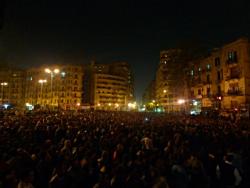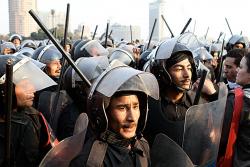A
tense calm settled over Cairo after yesterday’s street demonstrations.
But if there is a truce it will not last long. Last night after some
15,000 protesters decided to stage a vigil in Liberation Square in
protest against police violence. News reports speak of three people
killed yesterday, of which one was a policeman. The real figure may be
higher.
 Protests 25th January. Photo: Al Jazeera EnglishSources
Protests 25th January. Photo: Al Jazeera EnglishSources
Cairo report that the organisers plan to continue the protest until
Mubarak is gone. This moment may not be so far away. Arabic internet
sites were reporting today (Wednesday) that Hosni Mubarak’s son and
chosen successor as Egyptian president secretly took himself and family
out of the country Tuesday by way of the military airfield in West Cairo
at the peak of anti-government protests. Twitter also carried an
unconfirmed report that Suzanne Mubarak, Egypt’s first lady, was
identified by airport workers on arrival at Heathrow airport, London.
Twitter’s service was blocked in Egypt this morning. This shows that
the government is panicking. But this measure did not stop opposition
calling for the demonstrations to continue. They were heartened by their
success Tuesday in getting hundreds of thousands out on the streets to
demand the president’s resignation and they have been further encouraged
by reports of Gemal’s desertion.
 Protests 25th January. Photo: Al Jazeera EnglishHowever,
Protests 25th January. Photo: Al Jazeera EnglishHowever,
no source was cited, and such reports must be treated with caution. In
this kind of situation there is always a proliferation of rumours,
mostly baseless. But if Gemal Mubarak’s defection is confirmed, it would
point to deep cracks in the 82-year old president’s regime.
This is precisely the opposite of the sanguine opinions that have
been constantly repeated in the West. We are assured that Egypt is not
Tunisia; the regime is in no danger of being overthrown by the protest
movement, and so on.
A good example of this was an article from a BBC “expert” on Jan 17th,
who said that no revolt would happen in Egypt because people there are
apathetic: “Unlike Tunisia, the population has a much lower level of
education. Illiteracy is high, internet penetration is low.” The
article, signed by Jon Leyene in Cairo was entitled: “No sign Egypt will
take the Tunisian road.” Incredible, the same lines were left in
yesterday’s report about the mass demonstrations on the BBC website.
Even on Tuesday, when the people of Egypt had already taken to the
streets, Hillary Clinton said she believed the government was stable:
“Our assessment is that the Egyptian government is stable and is looking
for ways to respond to the legitimate needs and interests of the
Egyptian people,” Ms. Clinton said.
But her optimistic view is evidently not shared on Wall Street. Today
the Egyptian pound fell sharply against the US dollar and the Egyptian
stock market tumbled more than 4 percent. Clearly the hard-headed men of
business are better informed than the US Secretary of State. Today’s
editorial of the Washington Post shows a far more serious grasp of the
situation. It is worth quoting at length:
“The secretary’s words suggested that the administration remains dangerously behind the pace of events in the Middle East.
It failed to anticipate Tunisia’s revolution; days before President
Zine el-Abidine Ben Ali was driven from the country Ms. Clinton said the
United States was ‘not taking sides’ between the dictator and his
protesting people. Last week President Obama called Mr. Mubarak but said
nothing about the political situation in Egypt – including the regime’s
plan to hold a one-sided presidential ‘election’ this fall that would
extend Mr. Mubarak’s mandate for another six years.“Tuesday’s events suggested that the Cairo government is not at all
stable. Three people were killed in the occasionally violent
demonstrations, and thousands of protesters remained camped in Cairo’s
central Tahrir Square overnight. They will not be easily satisfied –
because Mr. Mubarak in fact is not trying to ‘respond to legitimate
needs and interests.’ Instead the government is seeking to perpetuate
itself in power by force, and pave the way for an eventual dynastic
succession to power by Mr. Mubarak’s son.”
 Illustration: Latuff (twitpic.com/photos/CarlosLatuff)Here
Illustration: Latuff (twitpic.com/photos/CarlosLatuff)Here
we have the authentic voice of the serious strategists of Capital, as
opposed to the superficial Washington politicians and the BBC “Middle
East experts” whose expertise consist mainly in drinking gin and tonics
in a Cairo hotel and listening to gossip and the propaganda put out by
the regime to calm the nerves of western governments and investors.
The serious strategists of Capital tend to come to the same
conclusions as the Marxists, although with a slight delay and naturally
from their class point of view. In this case, they have understood what
we pointed out long ago: that the reactionary Arab regimes like Egypt
and Jordan are hanging by a thread and can be overthrown at any time.
The Washington Post understands that there is a serious danger of a
revolution in Egypt, which will have far more serious consequences for
the economic and strategic interests of the USA than the Tunisian
uprising:
“Egypt has been a vital ally of the United States, and a potential
change of regime there is frightening to many in Washington, especially
given the strength of the country’s Islamist movement. Those concerns
are legitimate. But blind U.S. backing for Mr. Mubarak makes a political
disaster in Egypt more rather than less likely. Instead of stressing
the government’s stability, Ms. Clinton and Mr. Obama need to begin
talking about how it must change.”
These are serious people. Unlike Ms. Clinton, they realise that
Mubarak is finished, and any attempt to prop him up will only make
things worse. Change is necessary, and Washington must try to control it
and steer it into safe channels. The first step must be to get rid of
Mubarak, But here they hit a number of problems. In the first place,
Mubarak and his family have their own interests and they do not wish to
surrender power.
 Police guarding protesters yesterday. Photo: Sarah CarrThe
Police guarding protesters yesterday. Photo: Sarah CarrThe
second problem is even more serious. If Mubarak is removed, who will
replace him? They express concern about the Islamists. But their real
concern is what they call “the Arab street”, that is to say, the Arab
masses. The Islamists have so far been conspicuous by their absence. In
Tunisia they have played little or no role. In Egypt the real
reactionary face of the fundamentalists is shown by their attitude to
the protest movement. The Islamic parties led by the Muslim Brotherhood,
did not play any role in the organisation of this action and originally they even opposed it.
Only at a later stage were they forced to allow their members to
attend. That is a devastating comment on those sorry “Marxists” in
Europe who have been tail-ending the Islamists and given uncritical
support to the Muslim Brotherhood.
The Mubarak regime has lost its momentum. Grave domestic problems and
economic hardships have been piling up for 30 years. Now the day of
reckoning draws near. The spark from Tunis was sufficient to ignite a
powder keg that was prepared in advance. Egypt has not seen such stormy
demonstrations for more than a quarter century: not since 1977 when mass
riots forced Anwar Sadat to back down from bread price rises. And the
protests will not be silenced by batons and tear gas. Tension is running
high in Cairo. New explosions are being prepared.
On Tuesday, the authorities announced that Mubarak’s supporters would
mount a counter-demonstration the following day. This is playing with
fire. A collision between the two camps might well lead to further
upheavals and end in civil war – a civil war that Mubarak is not likely
to win. Yesterday already exposed cracks in the state apparatus. These
cracks will grow and undermine the whole edifice.
The movement has scarcely begun, and yet it has already acquired a
nationwide character. There were mass protests not just in Cairo but
also in Alexandria with thousands more in the cities of the Delta and
along the Suez Canal. And this is just the beginning. The real motor
force of the movement on the ground is not the Islamists but left wing
activists – and the masses: the workers, the unemployed, the urban poor,
the peasants and the revolutionary youth. We received this short report
about the situation this morning:
“The police has evacuated the Tahrir square with a real bombardment
of tear gas. The demonstrators have fled to the neighbouring streets.
Everything depends now in the next days of: 1) if the demonstrators come
back en masse on the streets, 2) do this in different cities, 3)
if the transport and industrial workers in the cities of Mahalla, Suez,
Tanta, Helwan, etc can be convinced to organise a general strike. If
this is the case the regime will not last long. (This was the problem
during the so-called ‘green revolution’ in Iran in 2009). Although the
spontaneity is very big, the organisation of the protest is weak and in
more importantly still ‘virtual’”.
 Protesters facing police last night. Photo: Sarah CarrThese
Protesters facing police last night. Photo: Sarah CarrThese
few lines go straight to the heart of the problem. The masses show
tremendous courage and élan. But they lack proper organisation and
leadership. This can complicate the whole process and give it a
convulsive and protracted character. Already in relation to the mass
revolutionary movement in Iran after the rigged election, we pointed out
that the spontaneous character of the movement was both its strength
and its weakness. Despite all the heroic efforts of the Iranian masses,
the regime was able to hold on to power – at least for a time.
It is inevitable that the movement in Egypt (which has many common
features with the movement in Iran) will pass through a series of
phases. There will be ebbs and flows, defeats as well as victories. But
in the course of struggle the masses will learn many lessons. They will
learn which leaders are to be trusted and which are to be rejected. They
will develop the adequate tactics and seek out the programme and ideas
that can guarantee victory.
That task would be immeasurably easier if there existed a genuine
revolutionary party, like the Russian Bolsheviks under Lenin and
Trotsky. Unfortunately, such a party does not yet exist. It has to be
built in the course of the struggle itself. But the masses and
especially their most advanced elements and the youth will learn quickly
on the basis of events.
The decisive element in the equation, as our correspondent points
out, is the mighty Egyptian proletariat, which in recent years has shown
its fighting spirit in a wave of strikes. These strikes were a
preparatory school for the present revolutionary movement. The task now
is to generalise the strike movement under the slogan of a national,
all-out political general strike. This must be prepared by action
committees in every locality. The absence of a representative
organisation can be compensate for by the formation of such committees
in every workers’ district, every factory, every village. Once the
committees are linked up on a local, regional and national basis, they
would form an alternative power that could challenge the rotten and
corrupt Mubarak state.
At the present stage the main demands are of a
revolutionary-democratic character. Down with the government! No to sham
elections! For a Constituent Assembly to work out a new and democratic
constitution! For full democratic rights now! But for the workers and
peasants, the unemployed and homeless, democracy is not an end in itself
but a means to an end.
A genuinely democratic regime would sweep away the corrupt
politicians and gangsters. It would arrest and punish those guilty of
oppressing and robbing the people. It would confiscate the fortunes of
the rich and expropriate the property of the imperialists who have
looted the wealth of Egypt for years. Such a policy can only be carried
out by a workers’ and peasants’ government. That must be our aim.
The imperialists are worried that the overthrow of Mubarak will
deprive them of a key “ally” in the Middle East. Of course it will! The
people of Egypt will put an end to the shameful policy of Mubarak that
subordinates the proud Egyptian nation to the interests of the robbers
in Washington and their Israeli henchmen.
The whole Arab world is being shaken to its foundations.
Anti-government outbreaks have occurred in the streets of Tunisia,
Algeria, Yemen and Jordan. For the first time in decades, the Arab
masses are taking to the streets to fight corrupt and unpopular regimes
and overthrow them. Tunisia showed that this is possible. The coming
Egyptian Revolution will be a far more important event.
A revolutionary government will pursue a revolutionary foreign
policy. It is time that the vast wealth of the Arab lands was used for
the benefit of the people, not for the enrichment of a handful of
wealthy parasites and their western backers. The revolutionary overthrow
of these stooges of imperialism will lay the basis for a Socialist
Federation of the Middle East and a Socialist Federation of the Maghreb.
That is the only way forward.
